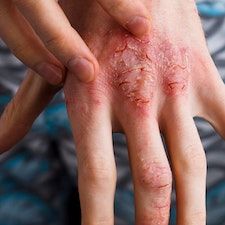Dupilumab Effective With or Without Topical Corticosteroids for Atopic Dermatitis
A new post-hoc analysis used 5 clinical trials on dupilumab to assess the drug’s effectiveness with and without topical corticosteroids for atopic dermatitis/eczema patients.

Dupilumab treatment with or without topical corticosteroids (TCS) leads to similar results for patients with moderate-to-severe atopic dermatitis (AD), according to new findings.1
This analysis was conducted to improve understanding of AD, a chronic skin condition believed to affect as many as 20% of children around the world and characterized by intense pruritus and eczematous lesions.
“Dupilumab demonstrated significant efficacy and a favourable safety profile in clinical trials in patients aged ≥ 6 years with moderate-to-severe AD, as well as in other type 2 inflammatory diseases,” the investigators wrote.
The study was authored by Ana B. Rossi, MD, from Regeneron Pharmaceuticals Inc., in New York, and aimed to analyze responses to dupilumab through baseline AD severity assessments of adolescents and adults.
Background and Findings
Rossi and colleagues included data in their analysis from 5 randomized, placebo-controlled, double-blind, phase 3 studies, each of which assessed the efficacy/safety of dupilumab in those with AD. They included 4 trials on adult patients and a single trial on adolescents.
The investigators assessed dupilumab response through AD severity at baseline in a total of 1719 study participants who were aged ≥12 years. The patients included had been given subcutaneous placebo or dupilumab as a monotherapy (300 mg for adults/adolescents or 200 mg for adolescents every 2 weeks; 16 weeks).
Additionally, some patients had also been using concomitant TCS along with dupilumab, as opposed to monotherapy. The investigators stratified all of the participants by baseline Investigator's Global Assessment (IGA) score, with 3 being moderate and 4 being severe.
The investigators noted that participants with moderate AD who had been given dupilumab treatment had a slightly higher proportion that had achieved clear or almost clear skin versus patients who had reported severe AD.
The research team additionally noted that the difference in risk between patients treated with the drug compared to patients treated with placebo ranged from 18.9 to 35.5 for moderate AD. They added that the range was 16.4 to 34.2 for severe AD.
Nevertheless, the researchers reported that of all other endpoints they had examined, no substantial differences or consistent response patterns were found between patients with moderate and severe AD.
“While response rates to dupilumab and placebo were generally higher in the moderate baseline subgroups than in the severe subgroups, these data from adults and adolescents show that dupilumab treatment benefits both patient populations,” they wrote. “We believe this analysis can help guide clinicians in counseling patients on the expected treatment effect based on the most commonly utilized assessments of disease severity.”
References
- Weidinger, S, Simpson, EL, Silverberg, JI, Schmitt, J, Leshem, YA, Katoh, N, et al. Efficacy of dupilumab in moderate and severe atopic dermatitis. JEADV Clin Pract. 2023; 1– 14. https://doi.org/10.1002/jvc2.100.